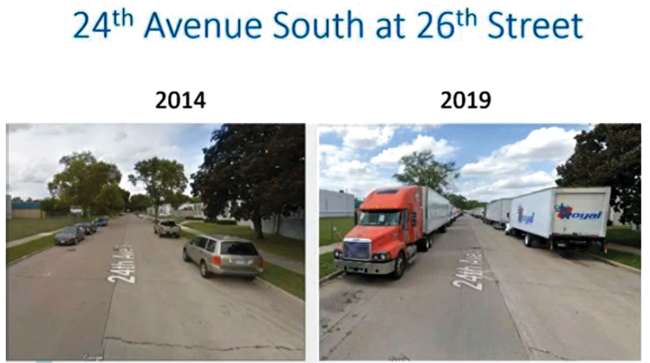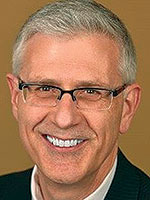Staff Reporter
Minneapolis City Council Committee OKs Amended Truck Parking Ban

[Stay on top of transportation news: Get TTNews in your inbox.]
The Minneapolis City Council’s Transportation and Public Works Committee on July 14 voted in favor of amendments introducing gradual fines, to accompany a proposed ban on truck parking in the city.
The city’s current ordinance prohibits vehicles weighing more than 6,000 pounds from parking on streets in residentially zoned areas, but does not present weight restrictions on parking in other areas.
The committee discussed the controversial issue during a public hearing June 23. But the full council referred the matter back to the committee for further consideration in early July. Now the measure again goes to the full council.
The measures approved by the committee July 14 include gradations in fines associated with truck parking violations — starting at $100 from Jan. 1, 2022, until Dec. 31, 2022, and $150 from Jan. 1, 2023, until Dec. 31, 2023. Fines thereafter would total $250.
The initial proposal suggested fines of $150 that would increase to $250 beginning in January 2023.
“This change gives a certain amount of grace to drivers while continuing to increase the fines,” said Council Member Jamal Osman, who represents Ward 6, which is home to a substantial East African community. He said many of his constituents operate trucks for a living.

Osman speaks at the July 14 virtual meeting. (Minneapolis City Council Transportation and Public Works Committee via YouTube)
Complaints from residents and businesses have to do with obstructed signage and fire hydrants, reduced parking availability for guests of local businesses, noise and emissions from idling trucks, encroachment into bicycle and car travel lanes, and litter.
The committee also approved a measure directing the department of Community Planning and Economic Development to work with interested parties to develop commercial truck parking spaces in the city. Commercial property owners and railroad companies should be included in this effort, according to the measure.
Additionally, members approved a provision directing the city’s Intergovernmental Relations staff to engage with the League of Minnesota Cities and regional partners to discuss the challenges of truck parking in the Twin Cities area and consider potential policy recommendations.
A third provision asks city staff members to deliver a report to the council in the fourth quarter of 2022 detailing the development of truck parking opportunities in Minneapolis, the progress of education and enforcement efforts and the results of intergovernmental work to find regional solutions to truck parking.
The proposed restrictions on truck parking state all vehicles that weigh more than 26,000 pounds would be prohibited from parking on any city street unless:
- They’re actively loading or unloading.
- They’re stopped at the direction of a police officer.
- They’re in a zone with signage allowing parking of vehicles with increased weights.
The trucking industry has voiced opposition to the proposed parking restrictions. Executives from the Minnesota Trucking Association and the Owner-Operator Independent Drivers Association have pointed out many of the trucks parked in the city overnight are owned by independent contractors who live in Minneapolis.
“The Minnesota Trucking Association is extremely disappointed,” said MTA President John Hausladen. “The language adopted today puts the city in a purely reactive role, providing interested parties with only site search assistance. Language asking for greater regional solutions is all good, but it doesn’t change the fact starting Jan. 1, 2022, trucks will be ticketed for parking on Minneapolis city streets with no new safe parking options.”

Hausladen
OOIDA President Todd Spencer said most truck drivers would much rather park at rest areas that offer basic amenities such as food and restrooms.
“In other words, a lot of trucks probably park in Minneapolis because they simply lack any reasonable alternative,” Spencer said in a message to the council.
Lack of available truck parking is a pressing issue for the industry, ranking No. 3 on the American Transportation Research Institute’s Top Industry Issues report.
American Trucking Associations spokesman Sean McNally said a highway bill recently approved by the U.S. House of Representatives included $1 billion for truck parking purposes.
“We believe that state legislatures and city councils, all of whom benefit from trucks delivering goods to their jurisdictions, should likewise make providing safe truck parking a priority in their planning processes,” McNally said.
Want more news? Listen to today's daily briefing below or go here for more info:




